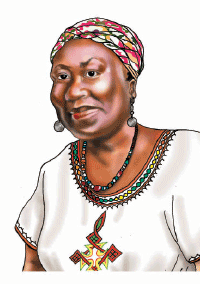Think. 1. Verb, transitive. 1. To form or have in the mind. 2. To determine, work out, etc. by reasoning. 3. To recall, recollect. Etc. 2. Verb, intransitive. 1. To use the mind, reflect or reason. 2. To have an opinion, belief, judgment, etc. 3.To invent or conceive (of). Etc.
When they enrolled their son in nursery school at the age of three, little Tommy’s parents were given a 15-item list of textbooks to buy for him. That was for Nursery One. Tommy is now in Nursery Two and his list of books for the year has grown also, now with 17 items on it, and they include titles like Understanding Mathematics Book I, Science and Technology Book I, Know your Aptitude Step 2. When I saw those lists I felt something was seriously wrong with our educational system, especially if that was what obtained in most of our schools. Then the thought occurred to me: Or is this a racket – merely a way to help the different authors make some fast money? One has heard stories about the manoeuvrings which go on in the textbook publishing business with regard to getting one’s manuscript accepted by a reputable publisher, and then the lobbying which has to be mounted to ensure that the book gets on the lists of schools.
I am shocked that a four year-old has to use 17 different textbooks in one school year; what on earth is she learning? At an age when children should simply be accompanied in their discovery of the world and guided into the acquisition of important life skills like critical thinking, we are wasting their lives pumping into their heads facts which they will be able to read by themselves in books once they acquire that ability. And we also ensure that our society lacks the capacity to truly develop, since we remain consumers of the products of other people’s minds rather than inventors, having the ability to think into existence products that address our situations and solve our own problems.
The effects of our neglect of critical thinking in our educational system are evident all around us. For example, consider the poor quality of several government policies – how long will it take us to realise, for instance, that competence, not federal character, is what will promote development? It is equally evident in our inability to complete a thought process and convert it into appropriate, beneficial action – we realise that the blocked drainage needs to be cleared in order to reduce flooding, but those who come to clear it merely scoop all the dirt onto the side of the roads rather than into a wheelbarrow to dispose of it. Of course, the rain washes half of it right back into the gutter, and several months later the rest has solidified into a mound with tall grasses growing on it. Why is it impossible to think of scooping out the dirt and disposing of it at the same time? It is the same way the federal and state road maintenance services fix the potholes on our roads. First, a team arrives which draws lines around the potholes, followed two weeks later by the team which scoops out the old tar. Very often, nothing may happen again for several months, so that the state of the road becomes worse than before the intervention by the authorities. Our thoughts and actions don’t come together in a connected chain.
Some people have suggested that lack of adequate feeding, especially the absence of sufficient protein during childhood, might be responsible for the poor quality of our minds. In many homes children are given very little meat, presumably to prevent them from developing a taste for it and therefore beginning to steal it (get the logic?) Children, in general, are condemned to eating the legs and wings of chicken, for example. While this may be debatable, there is no doubt that the wrong approach we have to the education of our children must definitely compound our situation, for it has been shown that certain skills need to be acquired very early in life in order for them to impact on the whole of life.
It is a terrible thing to waste a mind. Of course, everybody is capable of thought, and everybody thinks. However, there is a level of thinking that is not befitting of a human being, given the potential we have for far loftier, much more consequential thought. We must have the capacity for critical thinking, which requires that we be responsive to information rather than merely accepting it – like the university students who end up with a first class degree due to their ability to cram all the material presented and regurgitate it during exams. The ability to observe closely and draw conclusions, make comparisons and analyse material are so crucial for the development of society. Those are the basic elements for research and, as we know, it is research that leads to inventions.
Let us be the ones to think critically about the problems confronting us – malaria, Lassa fever, Boko Haram, kidnapping, rape, corruption – and let us find lasting solutions to them. The Western nations do not always have to be the thinkers in our stead; we don’t have to be recipients of aid forever. Let us begin to steer our children towards thinking, and stop stuffing their poor heads with mere data.













